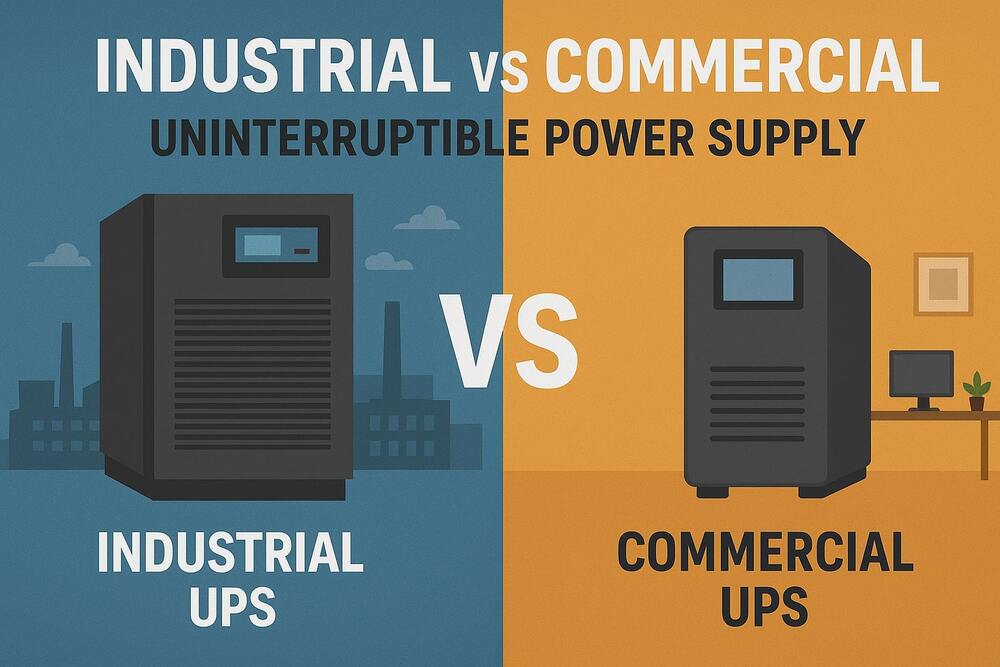In an era of increasingly critical uptime requirements — from manufacturing plants to data centers — selecting the correct uninterruptible power supply is paramount. Whether you’re looking at an industrial UPS system or a commercial UPS, the decision can significantly impact the resilience, scalability and safety of your electrical infrastructure.
Defining the Terms
A commercial UPS typically supports business-continuity and IT-infrastructure applications: server rooms, offices, retail operations and lower-risk facilities. On the other hand, an industrial UPS system (sometimes framed as a heavy-duty or rugged UPS solution) is designed for harsher environments, demanding loads and mission-critical equipment in industrial settings.
In essence, when you search for UPS industrial or industrial uninterruptible power supply, you’re exploring solutions that cater to manufacturing floors, oil & gas plants, transportation systems and other settings where the cost of downtime or power disturbance is extremely high.
Key Differences Between Industrial and Commercial UPS Systems
Understanding the difference between industrial and commercial UPS systems helps guide your specification, procurement and deployment. Some of the principal distinctions are as follows:
- Environmental robustness: Industrial units are built for rough environments — dust, vibration, moisture, corrosive atmospheres and wide temperature fluctuations. Commercial units are used in cleaner, climate-controlled indoor spaces. For example, one industry source states that industrial UPS may operate in high humidity, dust-laden air, or loosely controlled ambient conditions, whereas commercial UPS is engineered for HVAC-controlled rooms.
- Load capacity & runtime: Industrial systems often support much larger loads, longer runtimes, and modular expansion. They may serve heavy motors, production lines or large automation systems. Commercial systems, while still capable, are more modestly scaled for typical IT or facility loads.
- Design and customization: Industrial UPS are often engineer-to-order, allowing customization of battery banks, cabinet design, redundancy schemes, and harsh-environment specifications. Commercial UPS are generally more standardized, facilitating faster deployment at lower cost.
- Safety, redundancy and mission-criticality: In industrial settings, failure may threaten safety, production, or regulatory compliance. Thus, industrial UPS solutions often offer higher redundancy, robust monitoring, maintenance bypass, galvanic isolation and longer service life. Commercial UPS focus more on business continuity and data protection.
What Does This Mean for Applications Like Data Centers?
Consider the scenario of a uninterruptible power supply data center. Data-centers require UPS systems for power continuity, surge protection and clean electrical output. In many cases a standard commercial UPS could suffice — provided the environment is controlled (e.g., temperature, humidity, dust). However, if the data center is located in a harsher environment (e.g., remote, exposed to industrial pollution, or serving heavy equipment) then a more industrial-grade UPS would be preferable.
One must also think about scalability and future growth: if your data-center may evolve into an edge-manufacturing facility, or is adjacent to heavy industrial loads, choosing a UPS that can handle those shifted demands may save cost and redesign later.
Choosing Among Industrial UPS Manufacturers
Working with reputed industrial UPS manufacturers is critical. These vendors often provide end-to-end services: system analysis, engineering design, site commissioning, specialized battery banks, remote monitoring and maintenance contracts. When evaluating vendors, ask for:
- Clear specification of operating environment (dust, temperature, humidity), ingress protection (IP), and mechanical ruggedness.
- Redundancy architecture, including N+1 configuration, parallel modules, and hot-swappable components.
- Battery technology options such as lead-acid, lithium-ion, or fuel cells, along with expected runtime under full load, lifecycle, and maintenance requirements.
- Monitoring and diagnostics capabilities, including real-time alerts, network integration, and predictive maintenance features.
- Compliance with international standards such as IEC/EN 62040 (for UPS) and other relevant build and safety certifications.
Choosing one of the leading industrial UPS manufacturers means going beyond the equipment — it means ensuring a long-term service relationship, spare-parts availability, upgrade paths and site-specific adaptations.
Final Thoughts: Commercial or Industrial — Which to Use?
The decision between a commercial and an industrial UPS often comes down to the environment, risk profile and load demands. If you’re operating in an office or standard data-centre environment with moderate risk and controlled conditions, a commercial UPS may suffice. But if you’re in manufacturing, heavy industry, remote location, or you cannot afford any downtime or harm to people or process, you should seriously evaluate an industrial uninterruptible power supply.
Selecting the right type of UPS system ensures robust power protection, aligns with your operational environment, and supports your long-term reliability goals. Partnering with trusted industrial UPS manufacturers and specifying correctly up-front can prevent costly mis-sizing, environmental mismatches, and downtime risk.
In short: for controlled environments, choose a commercial UPS; for demanding industrial contexts, invest in a true industrial UPS system to maintain power continuity, support your critical loads and minimise risk.
